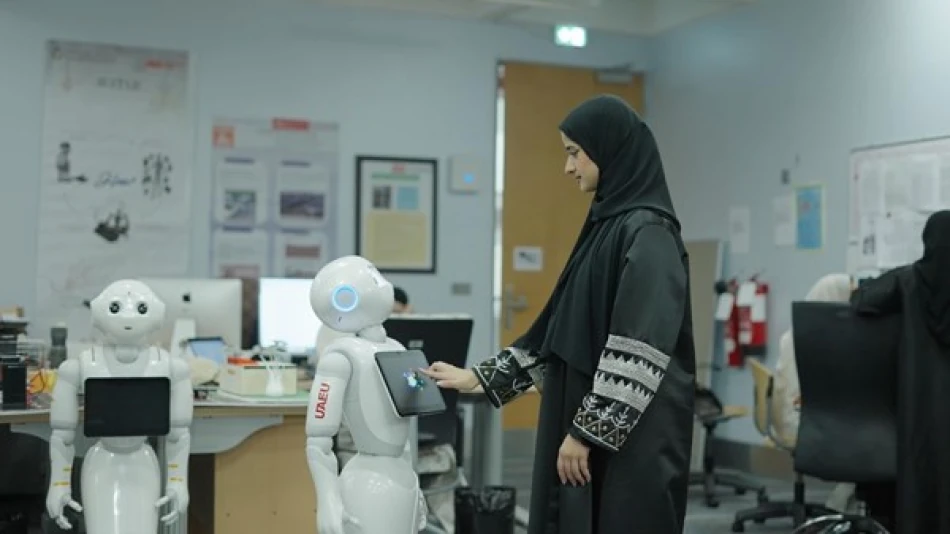
Emirati University Team Develops Robotic Swarms Mimicking Honeybees for Innovative Solutions
UAE Researchers Patent Revolutionary Swarm Robotics System for Underground Infrastructure
A research team from the United Arab Emirates University has secured a US patent for an advanced transformative robot swarm system designed to inspect and maintain underground pipelines. The breakthrough technology, inspired by ant and bee behavior, represents a significant leap forward in autonomous infrastructure management and could reshape how critical utilities are maintained across harsh environments worldwide.
Biomimetic Intelligence Meets Critical Infrastructure
The patented system leverages swarm intelligence principles borrowed from nature's most efficient collaborators. Dr. Fadi Al-Najjar, a specialist in human-centered artificial intelligence and neural robotics, led the interdisciplinary team alongside mechanical engineering expert Dr. Walid Ahmad, graduate researcher Amjad Al-Hassan, and technical engineer Muthanna Ahmad Aziz.
Each miniature robot within the swarm performs specialized functions—leak detection, high-resolution imaging, or precision repairs—while coordinating seamlessly with its counterparts. This distributed approach eliminates the need for costly excavation and reduces human intervention in hazardous underground environments.
Real-Time Adaptation in Hostile Environments
The robots demonstrate remarkable environmental adaptability, automatically redistributing tasks as conditions change. When one unit encounters an obstacle or malfunction, others compensate instantly, ensuring continuous operation in the complex maze of underground pipeline networks.
Economic and Environmental Impact
The technology addresses multiple pain points plaguing infrastructure operators globally. Traditional pipeline inspection requires expensive excavation, service disruptions, and significant environmental disturbance. The UAE system promises substantial reductions in operational costs while extending infrastructure lifespan and minimizing pollution from undetected leaks.
For utility companies and municipal authorities, this represents a paradigm shift toward predictive maintenance rather than reactive repairs. Early leak detection could prevent catastrophic failures that cost millions in emergency responses and environmental cleanup.
Market Positioning in the Gulf's Tech Ambitions
This patent aligns with the UAE's broader strategy to become a global technology hub, competing directly with Singapore's smart city initiatives and positioning itself ahead of regional rivals. The Gulf states have invested heavily in AI and robotics research, viewing technological leadership as essential for post-oil economic diversification.
Global Applications and Competitive Landscape
Similar swarm robotics research is underway in the United States and Europe, but the UAE team's focus on harsh environmental conditions gives them a unique advantage. The technology could prove invaluable in desert climates, offshore installations, and other extreme environments where traditional inspection methods fail.
Oil and gas companies operating in challenging terrains—from Arctic pipelines to Middle Eastern refineries—represent immediate commercial opportunities. The system's ability to operate continuously without surface access makes it particularly valuable for subsea applications and remote installations.
Investment and Commercialization Prospects
The US patent provides crucial intellectual property protection for potential licensing deals and joint ventures. Given the global infrastructure maintenance market's multi-billion-dollar scale, early commercialization could generate significant returns for UAE University and its research partners.
Dr. Al-Najjar emphasized the university's commitment to applied research supporting the knowledge economy, suggesting institutional backing for scaling the technology beyond laboratory demonstrations to real-world deployments.
Technical Innovation Meets Strategic Vision
The breakthrough demonstrates how targeted research investment can yield patents with genuine commercial potential. As infrastructure ages globally and maintenance costs soar, autonomous inspection systems represent both technological necessity and economic opportunity.
The UAE's success in securing international patent protection signals its researchers' ability to compete at the highest levels of technological innovation, potentially attracting additional investment and partnerships from multinational corporations seeking cutting-edge maintenance solutions.
Most Viewed News

 Layla Al Mansoori
Layla Al Mansoori






